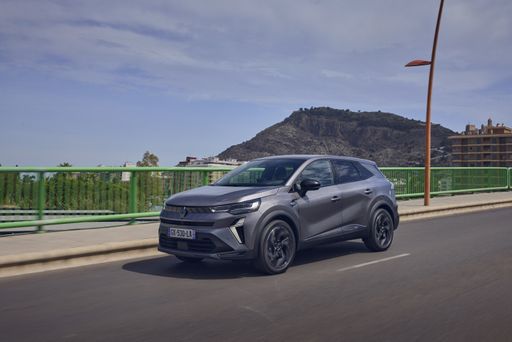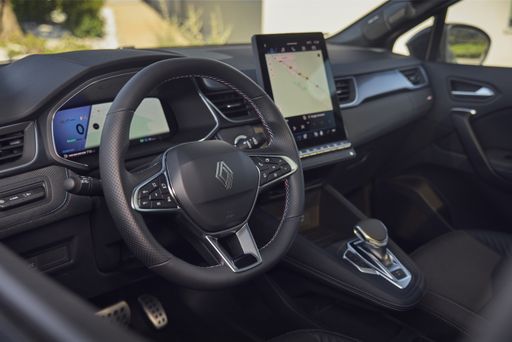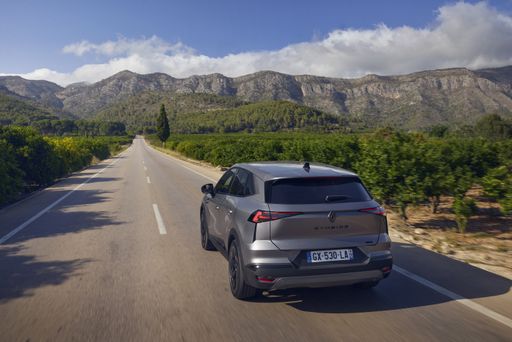Peugeot 208 vs Renault Symbioz - Differences and prices compared
Compare performance (156 HP vs 158 HP), boot space and price (20700 £ vs 24400 £ ) at a glance. Find out which car is the better choice for you – Peugeot 208 or Renault Symbioz?
Costs and Efficiency:
Price and efficiency are key factors when choosing a car – and this is often where the real differences emerge.
Peugeot 208 has a to a small extent advantage in terms of price – it starts at 20700 £ , while the Renault Symbioz costs 24400 £ . That’s a price difference of around 3746 £.
Both cars consume an average of 4.50 L per 100 km – no difference here.
Engine and Performance:
Power, torque and acceleration say a lot about how a car feels on the road. This is where you see which model delivers more driving dynamics.
When it comes to engine power, the Renault Symbioz has a barely noticeable edge – offering 158 HP compared to 156 HP. That’s roughly 2 HP more horsepower.
In acceleration from 0 to 100 km/h, the Peugeot 208 is barely noticeable quicker – completing the sprint in 8.30 s, while the Renault Symbioz takes 9.10 s. That’s about 0.80 s faster.
In terms of top speed, the Peugeot 208 performs barely noticeable better – reaching 200 km/h, while the Renault Symbioz tops out at 180 km/h. The difference is around 20 km/h.
There’s also a difference in torque: Peugeot 208 pulls slight stronger with 270 Nm compared to 265 Nm. That’s about 5 Nm difference.
Space and Everyday Use:
Cabin size, boot volume and payload all play a role in everyday practicality. Here, comfort and flexibility make the difference.
Both vehicles offer seating for 5 people.
In curb weight, Peugeot 208 is a bit lighter – 1165 kg compared to 1359 kg. The difference is around 194 kg.
In terms of boot space, the Renault Symbioz offers evident more room – 576 L compared to 352 L. That’s a difference of about 224 L.
In maximum load capacity, the Renault Symbioz performs clearly perceptible better – up to 1682 L, which is about 519 L more than the Peugeot 208.
When it comes to payload, Renault Symbioz slight takes the win – 459 kg compared to 430 kg. That’s a difference of about 29 kg.
Who wins the race in the data check?
The Peugeot 208 sits just ahead overall in the objective data comparison.
This result only shows which model scores more points on paper – not which of the two cars feels right for you.
Costs and Consumption
View detailed analysis
Engine and Performance
View detailed analysis
Dimensions and Body
View detailed analysis

Peugeot 208
Peugeot 208
The Peugeot 208 feels like a city-savvy fox: compact, stylish and surprisingly grown-up, with a cabin that punches above its weight and enough personality to make daily commutes a little less boring. It’s a smart pick for buyers who want chic practicality without the showroom bluster — easy to park, thrifty to run and oddly fun when the road tightens up.
details



Renault Symbioz
The Renault Symbioz feels less like a traditional car and more like a rolling living room that's been told it's allowed to drive — its flowing lines and minimalist cabin are pure concept-car theatre that teases the future of everyday transport. For buyers with an eye for design and a taste for tech-forward ideas, the Symbioz is an alluring vision of what Renault could offer tomorrow, even if it's not yet a model you can park in your driveway.
details


Costs and Consumption |
|
|---|---|
|
Price
20700 - 35200 £
|
Price
24400 - 30700 £
|
|
Consumption L/100km
4.5 - 5.2 L
|
Consumption L/100km
4.5 - 6 L
|
|
Consumption kWh/100km
14.1 - 15.4 kWh
|
Consumption kWh/100km
-
|
|
Electric Range
362 - 432 km
|
Electric Range
-
|
|
Battery Capacity
46 - 51 kWh
|
Battery Capacity
-
|
|
co2
0 - 117 g/km
|
co2
102 - 136 g/km
|
|
Fuel tank capacity
44 L
|
Fuel tank capacity
48 L
|
Dimensions and Body |
|
|---|---|
|
Body Type
Hatchback
|
Body Type
SUV
|
|
Seats
5
|
Seats
5
|
|
Doors
5
|
Doors
5
|
|
Curb weight
1165 - 1530 kg
|
Curb weight
1359 - 1465 kg
|
|
Trunk capacity
309 - 352 L
|
Trunk capacity
492 - 576 L
|
|
Length
4055 mm
|
Length
4413 mm
|
|
Width
1745 mm
|
Width
1797 mm
|
|
Height
1430 mm
|
Height
1575 mm
|
|
Max trunk capacity
1118 - 1163 L
|
Max trunk capacity
1682 L
|
|
Payload
380 - 430 kg
|
Payload
455 - 459 kg
|
Engine and Performance |
|
|---|---|
|
Engine Type
Petrol, Electric, Petrol MHEV
|
Engine Type
Full Hybrid, Petrol MHEV
|
|
Transmission
Manuel, Automatic
|
Transmission
Automatic, Manuel
|
|
Transmission Detail
Manual Gearbox, Reduction Gearbox, Dual-Clutch Automatic
|
Transmission Detail
Automatic Gearbox, Manual Gearbox, Dual-Clutch Automatic
|
|
Drive Type
Front-Wheel Drive
|
Drive Type
Front-Wheel Drive
|
|
Power HP
101 - 156 HP
|
Power HP
140 - 158 HP
|
|
Acceleration 0-100km/h
8.3 - 10.9 s
|
Acceleration 0-100km/h
9.1 - 11 s
|
|
Max Speed
150 - 200 km/h
|
Max Speed
180 km/h
|
|
Torque
205 - 270 Nm
|
Torque
250 - 265 Nm
|
|
Number of Cylinders
3
|
Number of Cylinders
4
|
|
Power kW
74 - 115 kW
|
Power kW
103 - 116 kW
|
|
Engine capacity
1199 cm3
|
Engine capacity
1332 - 1789 cm3
|
General |
|
|---|---|
|
Model Year
2023 - 2025
|
Model Year
2025
|
|
CO2 Efficiency Class
D, A, C
|
CO2 Efficiency Class
C, D, E
|
|
Brand
Peugeot
|
Brand
Renault
|
What drive types are available for the Peugeot 208?
The Peugeot 208 is offered with Front-Wheel Drive.




